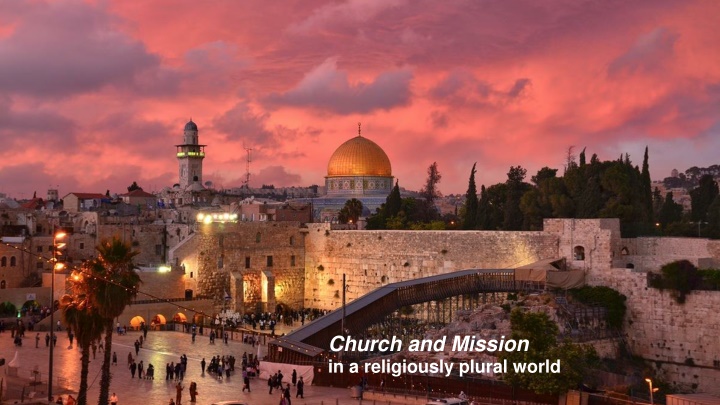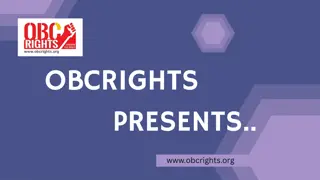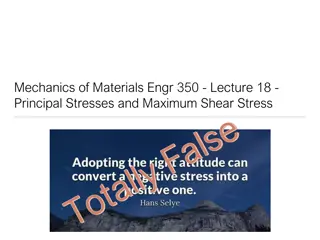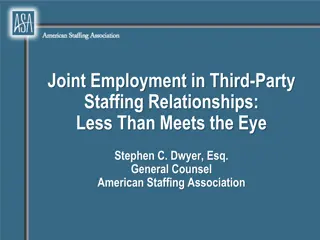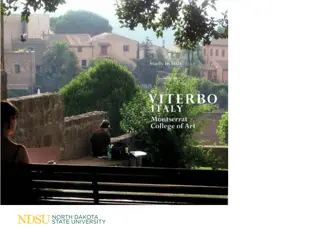Principal (Grades 9-12) - PFE Scholarship Application and Staffing Team Guidelines
The Principal (Grades 9-12) is responsible for overseeing the Partnering for Eternity (PFE) program, including facilitating effective communication among team members, sharing the program's story in communities and churches, and participating in site visits. The role involves identifying committed team members, ensuring proper training completion, and maintaining continuity within the team. Various team roles such as Coordinator, Mentor Liaison, Treasurer, and Fundraiser are outlined, each with specific time commitments and responsibilities.
Download Presentation

Please find below an Image/Link to download the presentation.
The content on the website is provided AS IS for your information and personal use only. It may not be sold, licensed, or shared on other websites without obtaining consent from the author.If you encounter any issues during the download, it is possible that the publisher has removed the file from their server.
You are allowed to download the files provided on this website for personal or commercial use, subject to the condition that they are used lawfully. All files are the property of their respective owners.
The content on the website is provided AS IS for your information and personal use only. It may not be sold, licensed, or shared on other websites without obtaining consent from the author.
E N D
Presentation Transcript
Church and Mission in a religiously plural world
Church and Mission Vatican I uses Gospel only once and never speaks of evangelisation . Mission is what happens out there , an expansionist activity away from centre. Vatican II mentions Gospel 157 times and evangelisation 31 times. Primary focus on sacramental mystery of Church and pastoral nature as People of God in relationship with other Christians and other religions. More to mission than activity . Cause of shift? Impact of evangelical and particularly Reformed Theology with strong emphasis on Word of God entering into very heart of world and constantly transforming Church. Karl Barth seeks return to Trinitarian origins of Mission: before becoming identified with places and activities, mission refers to what God Father does in sending Word and Spirit. Most important single statement in Vatican II decree on missionary activity : The pilgrim Church is missionary by its very nature, for it is from the mission of the Son and the mission of the Holy Spirit that it takes its origin, in accordance with the decree of God the Father. (Ad Gentes 2) Missio Dei: God s Mission creative-saving activity in which Church participates. What is nature of participation? How active , how passive ? If Mission is what Goddoes, what does Church do ? In Vatican II s new Pentecost Church recovers sense of origins. Acts 2: not formed as community which then goes out to speak BUT in speaking/confessing/praising finding an identity as community formed in power of Spirit and called to witness to what it knows.
Catholic as Missionary - Proclamation and Manifestation In dialogue with other Christians Catholics retrieved concept of Missio Dei: Church does not have a mission ; Church is missionary. Many forms of missionary practice, held together by proclamation of Gospel message of Kingdom of God, God s sovereignty. We have something to say. (Paul VI in ES) Catholic contribution to theology of mission from Lumen Gentium: as Christ sacrament of God, so Church sacrament of Christ. Sacramental actions, lives lived in the Spirit and actions they inspire, bring about an embodied manifestation of Word which complements proclamation of Gospel. Vatican II tension expressed in major texts on missionary Church s relations ad extra : Lumen Gentium different religions, cultures, communities related Nostra Aetate primary relationship which forms Church Gaudium et Spes contemporary culture in which Church shares Ad Gentes subtitled missionary activity , broader than missions Just as People of God caught up in Trinitarian God s work of new creation in Word and Spirit, so their living out of what they know of God s powerful action speaks of single mystery of creation-and- redemption, revealed in story of Jesus and story of people of Israel of which Church is first fruits . Marks of Church: Missionary activity extends the saving activity of the Church, it expands and perfects its Catholic unity, it is sustained by its apostolicity, it activates the collegiate sense of its hierarchy, and bears witness to its sanctity which it both extends and promotes. (AG 6)
Ad Gentes To the Nations The Son of God walked the ways of a true Incarnation that He might make human beings sharers in the nature of God: made poor for our sakes, though He had been rich, in order that His poverty might enrich us (2 Cor. 8:9). The Son of Man came not that He might be served, but that He might be a servant, and give His life as a ransom for the many - that is, for all (Mark 10:45). But what the Lord preached that one time, or what was wrought in Him for the saving of the human race, must be spread abroad and published to the ends of the earth (Acts 1:8), beginning from Jerusalem (Luke 24:27), so that what He accomplished at that one time for the salvation of all, may in the course of time come to achieve its effect in all. (3) On the day of Pentecost, the Church was publicly displayed to the multitude, the Gospel began to spread among the nations by means of preaching, and there was presaged that union of all peoples in the catholicity of the faith by means of the Church of the New Covenant. Now, the Lord Jesus, before freely giving His life for the world, did so arrange the Apostles' ministry and promise to send the Holy Spirit that both they and the Spirit might be associated in effecting the work of salvation always and everywhere. Throughout all ages, the Holy Spirit makes the entire Church one in communion and in ministering; instilling into the hearts of the faithful the same mission spirit which impelled Christ Himself. Sometimes He even visibly anticipates the Apostles' acting, just as He unceasingly accompanies and directs it in different ways. (4)
Whatever truth and grace are to be found among the nations, as a sort of secret presence of God, this activity frees from the taint of all evil and restores to Christ its maker, who overthrows the devil s domain and wards off the manifold malice of vice. And so, whatever good is found to be sown in the hearts and minds of human beings, or in the rites and cultures peculiar to particular peoples, is not lost. More than that it is ennobled and perfected for the glory of God, the shame of the demon, and the bliss of humanity. (9) The seed which is the Word of God, watered by divine dew, sprouts from the good ground and draws from thence its moisture, which it transforms and assimilates into itself, and finally bears much fruit. In harmony with the economy of the Incarnation, the young churches, borrow from the customs and traditions of their people, from their wisdom and their learning, from their arts and disciplines, all those things which can contribute to the glory of their Creator, or enhance the grace of their Saviour, or dispose Christian life the way it should be. To achieve this goal, it is necessary that in each major socio-cultural area, such theological speculation should be encouraged, in the light of the universal Church's tradition, as may submit to a new scrutiny the words and deeds which God has revealed. Thus it will be more clearly seen in what ways faith may seek for understanding, with due regard for the philosophy and wisdom of these peoples. From here the way will be opened to a more profound adaptation in the whole area of Christian life. (22)
Building on Tradition Ad Gentes last document to be promulgated, in part because original process was Rome-based and took little notice of missionary context; drafts lacking focus on motivation for mission. Ironically final draft got highest approval rating - 2394 votes to 5. Built on Council s experience (1st chapter drafted by Yves Congar) but also mediating between two Catholic schools of missiology, one (M nster) emphasising individual conversion, other (Louvain) focussing on planting Church . NEG: certain dichotomies remain beween foreign missions as local extensions of central authority; Christendom and pagan world ; clerical and lay. And dilemma: if non-Christians are orientated to Church what is missionary activity for? POS: Broadening of witness: traditional kerygmatic activity of proclamation set alongside more dialogical witness of manifestation, not just activities of service and pastoral care, reconciliation, struggle for justice, but especially where direct proclamation impossible teaching and learning with others how to engage in prophetic critique of human sinfulness. Gaudium et Spes: despite limitations of scope, takes up pastoral seeks wider prophetic dimension, beginning not with theological principles but wish to share whatever is genuinely human. Different from AG but complementary with generous attention to other not as threat but as gift, thus forming engaged Church which is prepared to address crises of modernity with which Vat 2 began.
Signs of the Times When evening comes, you say, It will be fair weather, for the sky is red, and in the morning, Today it will be stormy, for the sky is red and overcast. You know how to interpret the appearance of the sky, but you cannot interpret the signs of the times.A wicked and adulterous generation looks for a sign, but none will be given it except the sign of Jonah.
In calling Council and later in Pacem in Terris John XXIII asked Church to distinguish between negative and positive character of human beings historical and daily experience. Gaudium et Spes: The Church has the duty in every age of examining the signs of the times and interpreting them in the light of the Gospel, so that it can offer in a manner appropriate to each generation replies to the continual human questionings on the meaning of this life and the life to come and on how they are related. (4) Ecumenism and Religious Freedom: examples of social and cultural shifts which Church must address: Christian unity, place of religious faith in secular pluralist society; once mentioned in Life of Priests, who are exhorted to recognize lay-people s experience and competence in various fields of human activity. (9) Emphasis on examining with discernment. Gaudium et Spes: inspired by vision of the Spirit of the Lord who fills the whole world. God s people works to discern the true signs of God s presence and purpose in the events, needs and desires which it shares with the rest of modern humanity . (11) NB signs of the times are always discerned in the light of the Gospel. Council does not place human experience ahead of revelation but seeks only to make person and work of Jesus Christ norm by which God s presence to world may be known. This is what Church knows: present human experience only properly seen in the light of the Church s faith, responding to God s self-revelation. But this is not to say that encounter with another person of faith and dialogues that follow may not provoke a deeper understanding of mystery of God s life which is beyond full comprehension.
Evangelii Nuntiandi Apostolic Exhortation of Paul VI (1975) Evangelizing means bringing the Good News into all the strata of humanity, and through its influence transforming humanity from within and making it new. The purpose of evangelization is precisely this interior change, and if it had to be expressed in one sentence the best way of stating it would be to say that the Church evangelizes when she seeks to convert, solely through the divine power of the message she proclaims, both the personal and collective consciences of people, the activities in which they engage, and the lives and concrete milieu which are theirs. For the Church it is a question not only of preaching the Gospel in ever wider geographic areas or to ever greater numbers of people, but also of affecting and as it were upsetting, through the power of the Gospel, mankind's criteria of judgment, determining values, points of interest, lines of thought, sources of inspiration and models of life, which are in contrast with the Word of God and the plan of salvation. All this could he expressed in the following words: what matters is to evangelize human culture and cultures in the wide and rich sense which these terms have in Gaudium et Spes, always taking the person as one's starting-point and always coming back to the relationships of people among themselves and with God. The kingdom which the Gospel proclaims is lived by people who are profoundly linked to a culture, and the building up of the kingdom cannot avoid borrowing the elements of human culture or cultures. The split between the Gospel and culture is without a doubt the drama of our time, just as it was of other times. Therefore every effort must be made to ensure a full evangelization of culture, or more correctly of cultures. They have to be regenerated by an encounter with the Gospel.
Catholic Approach to Mission Church becomes Church insofar as witnesses to these things (Luke 24) and continues to find ways of being true to hope that is within you (I Peter 3.14) as encounters new and diverse contexts. While context does not determine nature of mission, it inevitably affects form of communication, emphasis and balance between constants of faith, most obviously constancy of the Triune God who through mission of Word and Spirit sent into world calls humanity to respond to repeated questions: Christological (who is Jesus Christ, and what does he say about God?) Ecclesiological (what does Church say of itself as community of faith on mission?) Eschatological (when and how is God s reign to be established?) Soteriological (salvation beyond world, wholeness within, social transformation?) Anthropological (humanity as caught in darkness or already redeemed?) Christian faith is always and already expressed in a particular form or language and has to be translated into another language or cultural form if Gospel is to be communicated. Culture: The way we do things around here. (Anon) Webs of significance . (Clifford Geertz). A structure of feeling. (Williams) Making things in order to make sense of things. (MAB) Ad Gentes: faith seeks understanding by entering into worlds of religious discourse and philosophy. IE witness to hope involves more than finding word equivalents but attention to whatever shapes wider context in which words touch hearts of people.
Mission and Culture From culture as purely contingent set of meanings with no normative value; at best a necessary means to effect translation; at worst, treated with suspicion and to be discarded, once confronted with manifest truth of Gospel to culture as essentially process, manifested in history of people, which carries deepest memories, values and convictions which yet require transformation and perfection through dialogue with Gospel and social praxis. Inculturation : term first used in 1960s by Jesuit missiologists, building on early experience of like of Matteo Ricci, Roberto de Nobili, Ippolito Desideri etc. Shift from instrumental use of culture/language with which Church presents universal message to intrinsically theological model in which Church collaborates with work of Holy Spirit cultivating world. Definition by Pedro Arrupe, 1978: 'the incarnation of Christian life and of the Christian message in a particular cultural context, in such a way that this experience not only finds expression through elements proper to the culture in question, but becomes a principle that animates, directs and unifies the culture, transforming it and remaking it so as to bring about "a new creation . For discernment: when to identify with culture? - building up faith, reconstructing what destroyed. When to criticise? - opposing sinful structures and injustice in name of Gospel.
From Jewish Matrix to other others In words of Nostra Aetate, Christ is the way, the truth, and the life (John 14:6), in whom God has reconciled all things to Himself (Col 1.20): yet Christians often discern ray of that truth reflected in other religious traditions; thus - recognize, preserve and promote good things, spiritual and moral, as well as the socio-cultural values found among these people. If Old Covenant has not been replaced but remains significant for both Jewish and Christian faith, how to keep together yet differentiate between two interdependent traditions within a single history? What are implications of a rapprochement of respect between Jews and Christians two communities united in God s self-revealing love for other faith traditions? NB religions are communities, IE persons who find meaning in traditions of practice, before they can be differentiated as systems of thought or collections of beliefs. Interreligious dialogue takes place not between disembodied entities or isms but persons of faith guided by virtues of inter-personal living. Religions as schools where skills of human living and interaction are learned by taking funds of wisdom and applying to everyday experience, thus becoming habituated, building up sense of self and embedded as virtues: human qualities that emerge from purposive quest for Good, EG prudence, temperance, justice, fortitude etc, habitual dispositions that engage will. Interreligious dialogue as demanding more than pragmatic concerns for tolerance etc but virtuous learning to discern ray of that truth from and with the other.
Theology for dialogue A theology of religions which attends primarily to the constants of faith, articulating hope that is within you (1 Peter 3.15), preparing ground for meeting of persons of faith at whatever level, addressing questions arising from within Christian tradition as it seeks to articulate its faith. Theology of dialogue A theology of religions which works between, reflecting on the experience of being in dialogue, not just questions which arise from dialogue itself but effect that meeting stranger and encountering otherness has on inner integrity of home tradition - and how it affects outer relations. Both necessary; former attends to dogmatic questions to do with clarity and integrity of tradition, whereas latter arises from context of contemporary multicultural experience and questions the other may put to Christian faith. Is there more to dialogue agenda than method of witness which will communicate Christian truth more adequately? Or is it more about learning - in order to be a better witness? What are the virtues of interreligious dialogue? Who is Jesus in a world of many faiths?
